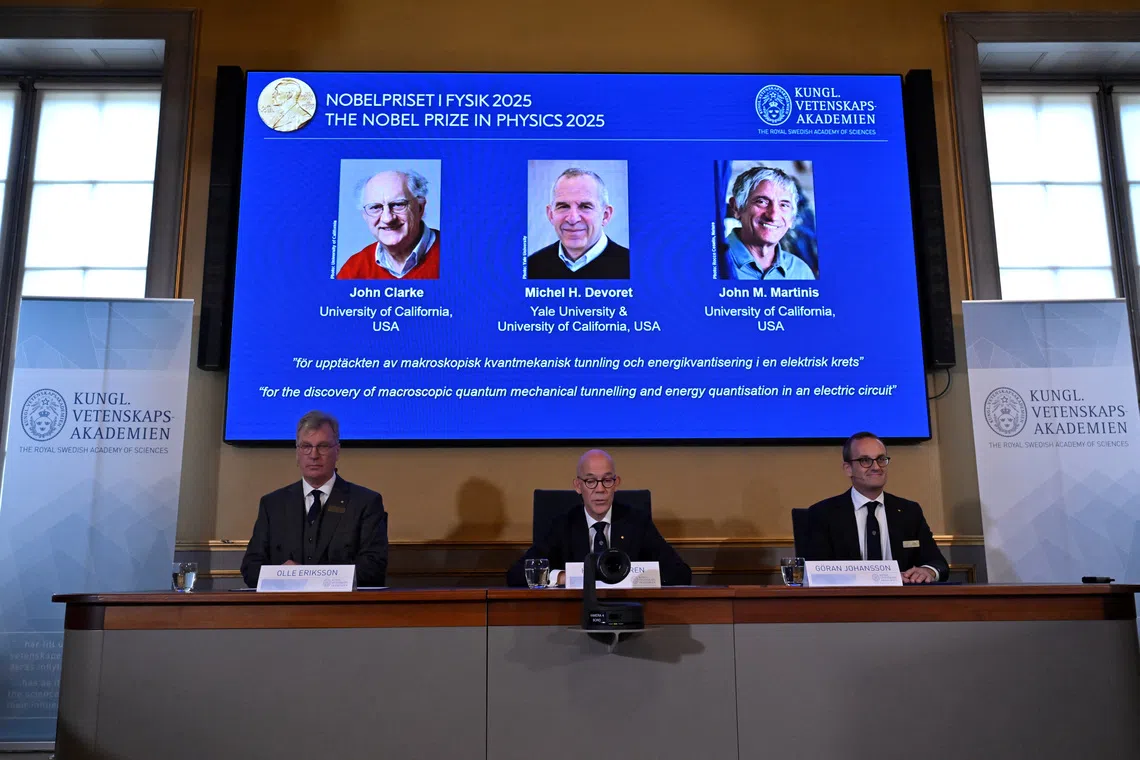Trio wins Nobel Prize in physics for quantum mechanical tunnelling
Sign up now: Get ST's newsletters delivered to your inbox

Scientists John Clarke, Michel Devoret and John Martinis were announced as winners of the 2025 Nobel Prize in physics.
PHOTO: REUTERS
STOCKHOLM – Briton John Clarke, Frenchman Michel Devoret and American John Martinis won on Oct 7 the 2025 Nobel Prize in physics for “the discovery of macroscopic quantum mechanical tunnelling and energy quantisation in an electric circuit”.
Quantum mechanics describes how differently things work on incredibly small scales.
For example, when a normal ball hits a wall, it bounces back. But on the quantum scale, a particle will actually pass straight through a comparable wall, a phenomenon called “tunnelling”.
The physics prize was awarded for experiments in the 1980s that showed that quantum tunnelling can also be observed on a macroscopic scale, involving multiple particles, by using superconductors.
In a series of experiments, the researchers demonstrated that “the bizarre properties of the quantum world can be made concrete in a system big enough to be held in the hand”, the Royal Swedish Academy of Sciences said in a statement.
The jury noted that the discoveries “provided opportunities for developing the next generation of quantum technology, including quantum cryptography, quantum computers, and quantum sensors”.
“It is wonderful to be able to celebrate the way that century-old quantum mechanics continually offers new surprises. It is also enormously useful, as quantum mechanics is the foundation of all digital technology,” said Dr Olle Eriksson, chair of the Nobel Committee for Physics, in a statement.
Professor Clarke, 83, is from the University of California, Berkeley, and Professor Devoret, 72, is from the University of California, Santa Barbara, and is listed as a professor emeritus at Yale University.
Professor Martinis, born 1958, is also from the University of California, Santa Barbara.
“To put it mildly, it was the surprise of my life,” Prof Clarke told reporters via telephone during the prize announcement, about learning of his award. “It never occurred to me in any way that this might be the basis of a Nobel Prize.”
Prof Clarke explained that the scientists were focused on the physics of their experiments, and that they did not realise the practical applications that could follow.
“It certainly had not occurred to us in any way that this discovery would have such a significant impact,” he said.
The Nobel physics prize includes a prize sum totalling 11 million Swedish kronor (S$1.5 million) that is shared among the winners if there are several, as is often the case.
Most prestigious award
The Nobel Prizes were established through the will of Alfred Nobel, who amassed a fortune from his invention of dynamite.
Since 1901, with occasional interruptions, the prizes have annually recognised achievements in science, literature and peace. Economics was a later addition.
Physics was the first category mentioned in Nobel’s will, likely reflecting the prominence of the field during his time. Today, the Nobel Prize in physics remains widely regarded as the most prestigious award in the discipline.
Past winners of the Nobel physics prize include some of the most influential figures in the history of science, such as Albert Einstein, Pierre and Marie Curie, Max Planck, and Niels Bohr, a pioneer of quantum theory.
The 2025 prize was won by American scientist John Hopfield and British-Canadian Geoffrey Hinton for breakthroughs in machine learning that spurred the artificial intelligence boom, a development about which both have also expressed concerns.
In keeping with tradition, physics is the second Nobel to be awarded this week, after two American and one Japanese scientist won the medicine prize
The science, literature and economics prizes will be presented to the laureates by the Swedish king at a ceremony in Stockholm on Dec 10, the anniversary of Alfred Nobel’s death, followed by a lavish banquet at city hall.
The Peace Prize, which will be announced on Oct 10, is awarded in a separate ceremony in Oslo. REUTERS, AFP


